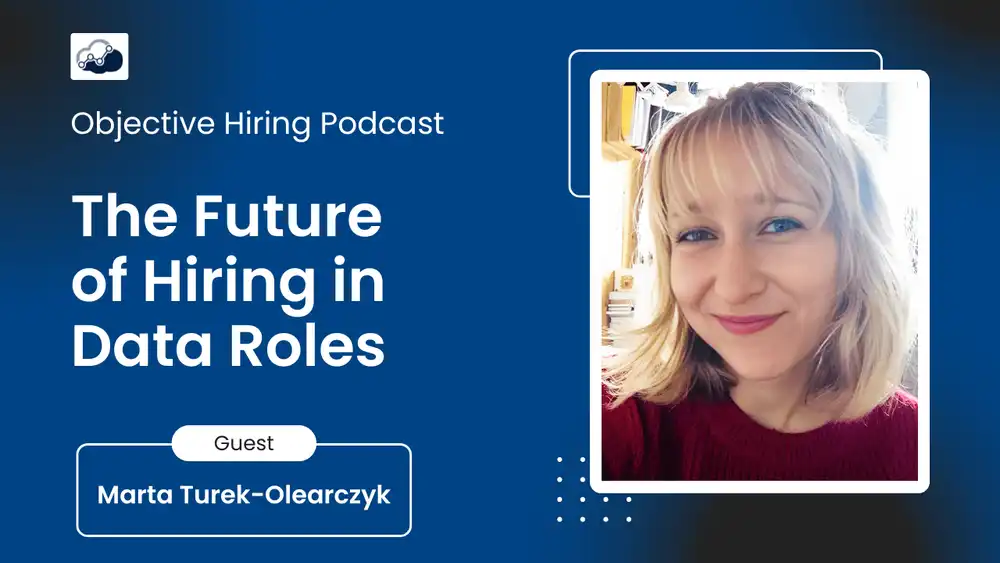Marta Turek-Olearczyk on the Future of Data Roles and Balancing Talent & Technology

Marta Turek-Olearczyk on the Future of Data Roles and Balancing Talent & Technology
In the latest episode of the Objective Hiring podcast, Marta Turek-Olearczyk joined Tim Freestone to explore the evolution of data roles in an AI-driven world. Marta provided valuable insights into the changing demands on data professionals and the critical balance between technical skills and domain expertise.
As AI reshapes the responsibilities of data analysts and data scientists, Marta’s expertise offers a roadmap for navigating this transformation. Her observations highlight the need for adaptability, contextual knowledge, and a strong foundation in theory to thrive in this ever-evolving field.
The Shifting Landscape of Data Roles
With advancements in AI and automation, the responsibilities of data professionals are rapidly changing. Tasks like basic data wrangling and generating simple visualisations are increasingly automated, prompting a shift in the skill set required for these roles.
"Baseline analysis is going to become more standardised and cookie-cutter," Marta explained. "What’s going to become more important is knowing how to apply the analysis and interpret it within a specific business context."
This shift means that while technical proficiency remains essential, contextual knowledge and domain expertise are becoming equally valuable. Data professionals must understand the nuances of their industry to make meaningful contributions.
Bridging Technical and Business Expertise
One of the recurring themes in the conversation was the importance of bridging the gap between technical skills and business acumen. Marta emphasised that data science is an applied science, and its value lies in solving real-world business problems.
"The most valuable data scientists are those who can apply their skills to a domain," Marta noted. "If you can’t translate your analysis into actionable business decisions, you haven’t produced anything worthwhile."
This sentiment underscores the growing demand for data professionals who can act as liaisons between technical teams and business stakeholders. Such individuals are uniquely positioned to ensure that insights derived from data lead to tangible outcomes.
The Risk of Relying Solely on AI
While AI offers incredible potential, Marta cautioned against over-reliance on automated tools. She highlighted the importance of a strong theoretical foundation to validate AI-generated results.
"If I don’t know what statistical test is appropriate or what model works best for a dataset, I’m in a danger zone," Marta said. "The output might look fine, but without theoretical knowledge, there’s a risk of producing entirely incorrect analyses."
This warning is particularly relevant as more organisations adopt AI-driven analytics tools. Without skilled professionals to interpret and validate these outputs, businesses risk making decisions based on flawed insights.
The Role of Domain Expertise
Marta also discussed the increasing value of domain expertise in data roles. As AI closes the technical skill gap, professionals with deep knowledge of their industry are better equipped to contextualise data and generate actionable insights.
"We do data science in the field of B2B marketing, and it’s not always easy to find candidates who have both the technical skills and the contextual knowledge," Marta explained. "Having that domain expertise makes a significant difference."
This trend suggests that data roles may become more accessible to individuals transitioning from other fields, such as business or marketing, provided they have a strong understanding of their domain and a willingness to learn technical skills.
Practical Recommendations for Data Professionals
Based on her observations, Marta shared several practical tips for data professionals looking to succeed in this evolving landscape:
- Invest in Theoretical Knowledge: Develop a strong foundation in statistics, machine learning, and data modelling to validate AI-generated outputs.
- Build Domain Expertise: Gain a deep understanding of the industry you work in to contextualise data and create meaningful insights.
- Learn to Communicate with Stakeholders: Hone your ability to explain technical concepts in simple terms and demonstrate the business value of your work.
- Embrace Lifelong Learning: Stay updated on the latest tools, techniques, and trends in data science to remain competitive.
- Focus on Problem-Solving: Shift your mindset from executing technical tasks to solving business problems.
These recommendations not only prepare professionals for the future but also position them as indispensable members of their organisations.
Looking Ahead: The Future of Data Roles
Marta and Tim speculated on how data roles might continue to evolve in the coming years. They discussed the possibility of these roles becoming less technical and more focused on domain expertise and strategic thinking.
"As AI handles more of the technical work, the relative value of domain knowledge and business acumen will increase," Marta predicted. "Data professionals who can bridge these areas will be in high demand."
This evolution highlights the importance of adaptability and a willingness to embrace change. As Marta aptly put it, "The ability to translate data into actionable insights is what sets great data professionals apart."
Conclusion
Marta Turek-Olearczyk’s insights on the future of data roles provide valuable guidance for professionals and hiring managers alike. By focusing on the interplay between technical skills, domain expertise, and business acumen, data professionals can position themselves for success in an AI-driven world.
To hear more from Marta, listen to the full episode of the Objective Hiring podcast. For companies looking to streamline their hiring process and find top talent, explore Alooba and sign up today.